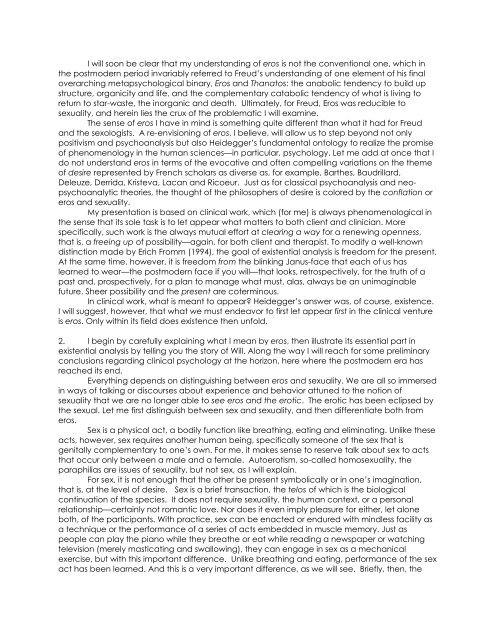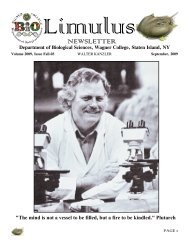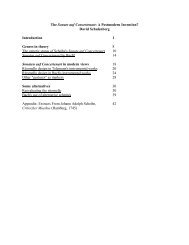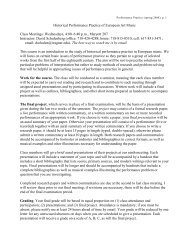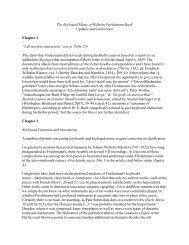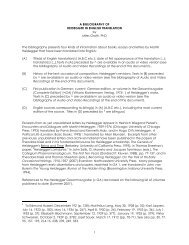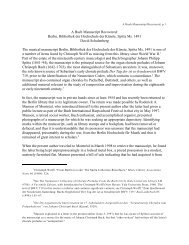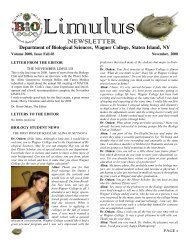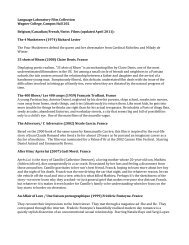SEVEN PAPERS ON EXISTENTIAL ANALYSIS ... - Wagner College
SEVEN PAPERS ON EXISTENTIAL ANALYSIS ... - Wagner College
SEVEN PAPERS ON EXISTENTIAL ANALYSIS ... - Wagner College
Create successful ePaper yourself
Turn your PDF publications into a flip-book with our unique Google optimized e-Paper software.
I will soon be clear that my understanding of eros is not the conventional one, which in<br />
the postmodern period invariably referred to Freud’s understanding of one element of his final<br />
overarching metapsychological binary, Eros and Thanatos: the anabolic tendency to build up<br />
structure, organicity and life, and the complementary catabolic tendency of what is living to<br />
return to star-waste, the inorganic and death. Ultimately, for Freud, Eros was reducible to<br />
sexuality, and herein lies the crux of the problematic I will examine.<br />
The sense of eros I have in mind is something quite different than what it had for Freud<br />
and the sexologists. A re-envisioning of eros, I believe, will allow us to step beyond not only<br />
positivism and psychoanalysis but also Heidegger’s fundamental ontology to realize the promise<br />
of phenomenology in the human sciences—in particular, psychology. Let me add at once that I<br />
do not understand eros in terms of the evocative and often compelling variations on the theme<br />
of desire represented by French scholars as diverse as, for example, Barthes, Baudrillard,<br />
Deleuze, Derrida, Kristeva, Lacan and Ricoeur. Just as for classical psychoanalysis and neopsychoanalytic<br />
theories, the thought of the philosophers of desire is colored by the conflation or<br />
eros and sexuality.<br />
My presentation is based on clinical work, which (for me) is always phenomenological in<br />
the sense that its sole task is to let appear what matters to both client and clinician. More<br />
specifically, such work is the always mutual effort at clearing a way for a renewing openness,<br />
that is, a freeing up of possibility—again, for both client and therapist. To modify a well-known<br />
distinction made by Erich Fromm (1994), the goal of existential analysis is freedom for the present.<br />
At the same time, however, it is freedom from the blinking Janus-face that each of us has<br />
learned to wear—the postmodern face if you will—that looks, retrospectively, for the truth of a<br />
past and, prospectively, for a plan to manage what must, alas, always be an unimaginable<br />
future. Sheer possibility and the present are coterminous.<br />
In clinical work, what is meant to appear? Heidegger’s answer was, of course, existence.<br />
I will suggest, however, that what we must endeavor to first let appear first in the clinical venture<br />
is eros. Only within its field does existence then unfold.<br />
2. I begin by carefully explaining what I mean by eros, then illustrate its essential part in<br />
existential analysis by telling you the story of Will. Along the way I will reach for some preliminary<br />
conclusions regarding clinical psychology at the horizon, here where the postmodern era has<br />
reached its end.<br />
Everything depends on distinguishing between eros and sexuality. We are all so immersed<br />
in ways of talking or discourses about experience and behavior attuned to the notion of<br />
sexuality that we are no longer able to see eros and the erotic. The erotic has been eclipsed by<br />
the sexual. Let me first distinguish between sex and sexuality, and then differentiate both from<br />
eros.<br />
Sex is a physical act, a bodily function like breathing, eating and eliminating. Unlike these<br />
acts, however, sex requires another human being, specifically someone of the sex that is<br />
genitally complementary to one’s own. For me, it makes sense to reserve talk about sex to acts<br />
that occur only between a male and a female. Autoerotism, so-called homosexuality, the<br />
paraphilias are issues of sexuality, but not sex, as I will explain.<br />
For sex, it is not enough that the other be present symbolically or in one’s imagination,<br />
that is, at the level of desire. Sex is a brief transaction, the telos of which is the biological<br />
continuation of the species. It does not require sexuality, the human context, or a personal<br />
relationship—certainly not romantic love. Nor does it even imply pleasure for either, let alone<br />
both, of the participants. With practice, sex can be enacted or endured with mindless facility as<br />
a technique or the performance of a series of acts embedded in muscle memory. Just as<br />
people can play the piano while they breathe or eat while reading a newspaper or watching<br />
television (merely masticating and swallowing), they can engage in sex as a mechanical<br />
exercise, but with this important difference. Unlike breathing and eating, performance of the sex<br />
act has been learned. And this is a very important difference, as we will see. Briefly, then, the


